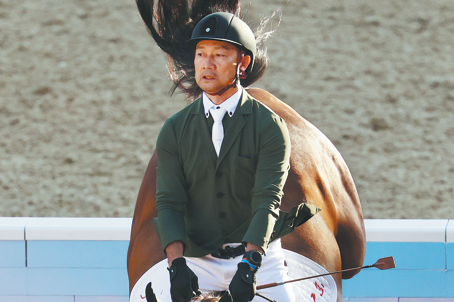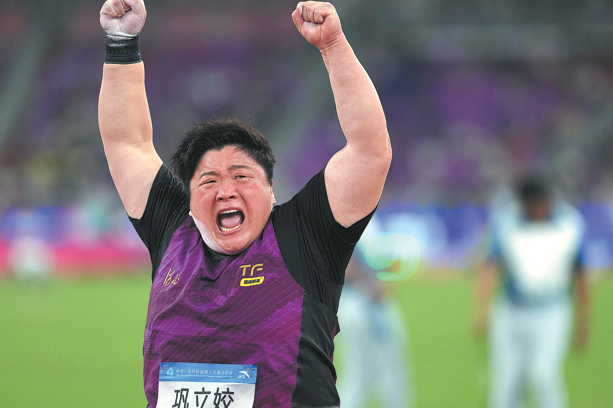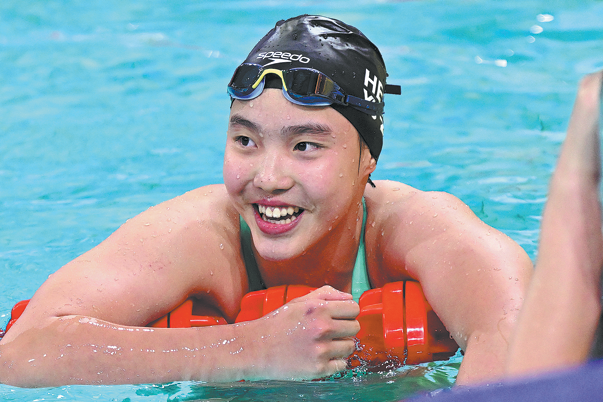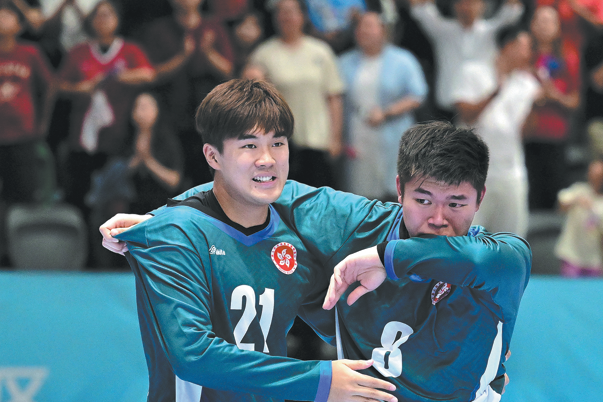China sees a jump in quality
Competitive level of nation's riders continues to rise


Hong Kong show jumping specialist Raena Leung said that, a decade ago, riders from the special administrative region used to enjoy an obvious advantage at nationwide equestrian events, but that is no longer the case, as the competitive level of riders from the Chinese mainland continues to rise.
"I started to compete in jumping events in the Chinese mainland in 2011. Back then, international competitions were just starting to emerge there. We were quite confident, and we would win those competitions, even without riding our own horses, due to the number of Hong Kong riders training in Europe at the time," Leung said after qualifying for the individual show jumping final at the 15th National Games in Shenzhen, Guangdong province on Wednesday.
"However, if you ask me now, even if I have a pretty good horse that's suitable for me, I can't say with certainty that I can win every competition. I don't think that's possible anymore, as the quality of the horses and the skills of the riders have really improved a lot," she said.
She credits the improvement to the fact that more young riders are able to regularly attend and compete at equestrian events, as well as train in Europe or work with foreign coaches.
"More importantly," she added, "their determination to excel in equestrian events is very strong, so they put in all their effort to learn and fully commit to it."
Many riders from the Chinese mainland now train, compete and buy horses in Europe. Furthermore, they bring that rich experience back home, to share with the domestic equestrian community, Leung said.
Also, the number of equestrian events, which cater to different levels of riders, being held in the mainland has soared in recent years to accommodate the surge in participants, she noted.
"Equestrian competitions, such as show jumping and dressage, are being held all over the country — in Beijing, Shanghai and Hangzhou. I feel that riders have a competition that they can participate in every week if they want to," said Leung who also coaches now.
"I often take young riders to compete in the Chinese mainland, and, sometimes, just to watch competitions there, so they can learn from good local riders," she said.
Hebei rider Wang Yunjing, who, on her horse Hoselinde, qualified in second place for the individual show jumping final at Shenzhen Guangming International Equestrian Center, agreed that there has been significant development in the mainland's equestrian prowess, both in terms of training facilities and techniques.
"For one, more foreign coaches are coming here to share their experience and introduce new things. Additionally, more people are getting involved in the sport, leading to improvements in all aspects," Wang said.
Wang, 27, fell in love with horse riding when she was 10. "There were only about a dozen young equestrian athletes in the Chinese mainland when I first started, and now that number has increased to more than 100," she added.
Those young athletes are more fortunate, as they have better conditions in which to train and improve their skills, said Wang, who has been training in Germany. "I am sure Chinese riders will win medals at the Olympics one day, and I believe it won't be long before they do."
What's made her more pleased is that, as well as riders' equestrian skills, the level of care and the wellbeing of the horses, which are seen as equal partners of the riders, has also been stepped up in the mainland, gradually aligning with international standards, Wang said.
With the support from the Hong Kong Jockey Club, the venue for the equestrian events at the National Games is equipped with an on-site equine clinic, which reflects the highest commitment to the animals' welfare and could be an example for the sport in China going forward.
Rebecca Parkes, an equine veterinarian with HKJC who leads a team of experts in running the unique facility, which can carry out surgeries on the horses if necessary, said that it's the first time the National Games have incorporated such a comprehensive veterinary facility.
"If any of the horses get particularly sick, or suffer an injury, then we're here. That's what the surgery is for," Parkes said.
As the level of competition in the mainland is increasing, the level of professionalism in equine veterinarian services also needs to be stepped up, Parkes said.
"There's a demand for high quality veterinary care, which is what we're trying to deliver here."
In Europe or the United States, at major competitions, there is usually a surgical facility close by, so if a horse gets sick or injured, they can receive timely treatment. That's why HKJC helped to design and build the clinic, to ensure that the horses have the care that they need, she added.
Equestrianism in the mainland has come a very long way since her first visit in 2015, said Parkes.
"The level of equestrian sport in China is now quite high," she said. "And I think the welfare standard of the sport has progressed as well."
Parkes has also been sharing her knowledge and providing hands-on training for vets within the mainland who want to become equine specialists. She believes that more equine vets are needed as the interest in equestrian sports continues to grow.
"There are some really great horse vets here, but there's not enough of them," she said, adding that the National Games' equestrian program is the first time she has been involved with a competition in the Chinese mainland.
Besides fracture specialists and farriers, the team has a pharmaceutical specialist available in Hong Kong if needed, Parkes said. "If she is required here, she can jump on the high-speed train and be here very quickly. Fortunately, though, we've had to treat very few horses."
HKJC CEO Winfried Engelbrecht-Bresges highlighted the new equestrian site in Shenzhen as a prime example of cooperation between Hong Kong and the Chinese mainland.
He hailed the National Games equestrian program, saying it was "of very high international standards — beautifully designed, highly functional and operated by a well-trained professional team."
Engelbrecht-Bresges also highlighted the maiden collaboration between the National Games and HKJC's world-class anti-doping laboratory to ensure the integrity of the equestrian competitions.
"The partnership ensures world-class facilities, top-level expertise and fairness throughout the National Games," he said.
He recalled that one of HKJC's first forays into the mainland was to assist the 2010 Guangzhou Asian Games, when the club established an equine disease-free zone.
"The legacy is now a horse racing training center in Guangzhou. And, with the boost from the National Games, Shenzhen now also boasts high-level equestrian facilities."
Xinhua contributed to this story.
cuijia@chinadaily.com.cn





























